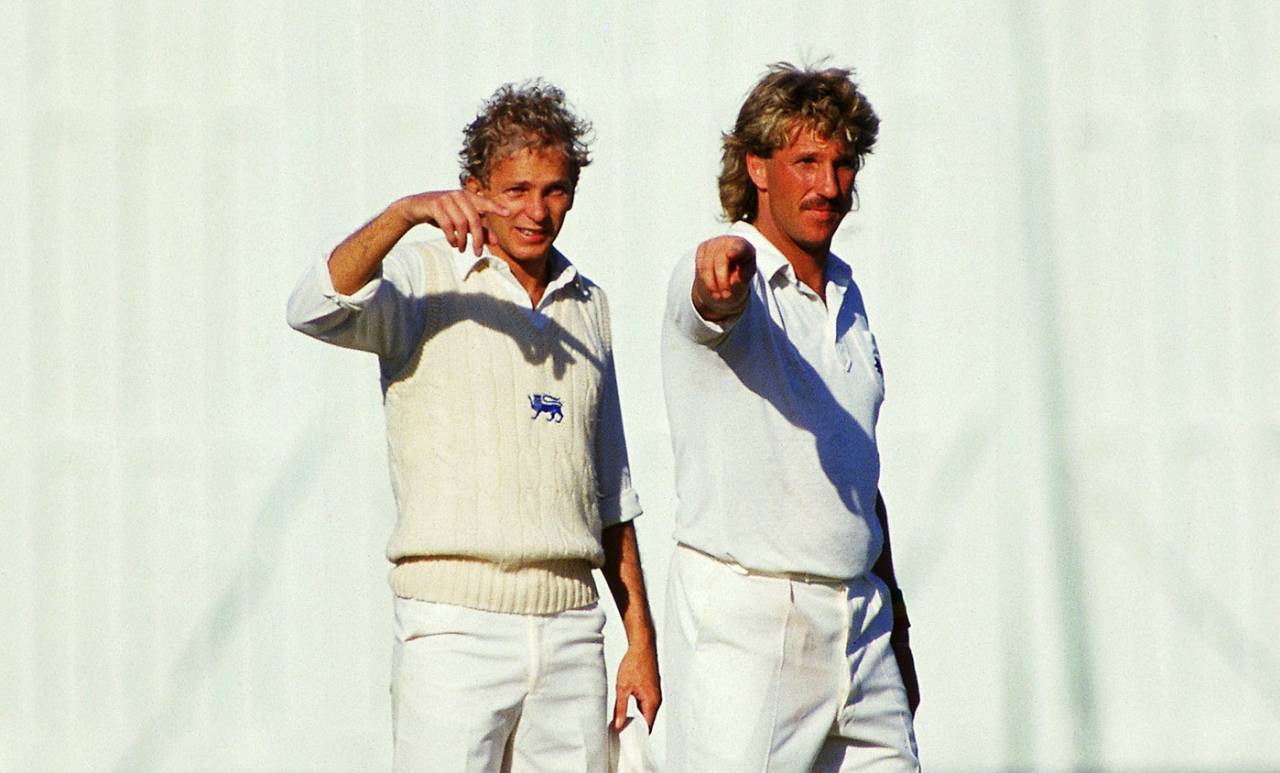The more I think about it, the more I realise I was not a normal child (in truth, I'm probably not a normal adult either, which is why I spend so much time alone staring at rectangles). By chance the other day I saw a picture of the early '80s version of a game I once had, the one whose box featured David Gower leaning cheesily on Ian Botham holding aloft his Duncan Fearnley. I was transported immediately to my bedroom floor one Friday night, when I was, I suppose, about eight.
Some friends of my parents had come round with their two sons and I persuaded them to play Test Match. Other kids didn't come round much. Then, as now, I wasn't a huge fan of other people. That night - and this seems remarkable now - we didn't play against each other. Rather I had a number of series ongoing - usually between teams of animals, so the dogs, for instance, were captained by the uncompromising middle-order terrier Ian Yappell and the feline side by the portly and accident-prone biffer Mike Catting - and the other boys and I took roles in that: one player batted and the other two took it in turns to bowl overs at him until he was out, at which everybody shuffled round a place. I recorded everything meticulously in my scorebook - which, obviously, nobody else was allowed to touch.
Players didn't win or lose: they facilitated the playing out of the fortunes of completely imaginary teams. If ever there was a dispute as to whether somebody was out or not, it would be settled by a compromise that, in retrospect, seems ridiculous: out in real life, not out in the scorebook, so we'd all shuffle round while the imaginary batsman was reprieved and continued his knock.
On the one hand it encouraged a great purity of sporting endeavour. If players were subservient to the scorebook, if that were seen as the greatest power, if they were playing not for their own glory but, as it were, neutrally to be the generators of history, the tendency was to play fair - to admit nicking it, to consider lbws with detachment. What was important wasn't individual glory but the accurate recording of the game.
On the other, it was bonkers. I suspect not even imaginary fans in the imaginary ground cared whether Graham Pooch had scored more imaginary runs for the series than Geoffrey Boycatt (to Boycatt himself, of course, it mattered profoundly), and yet for hours we faithfully recorded it all. We weren't playing: we were generating data.
In all honesty, I'd probably have preferred it if it had just been me. This was what I did as a kid for hour after hour. Cricket and tennis against myself against the wall in the garage, football played out on a Subbuteo pitch, endless snooker championships with a complex world-ranking system after I was given a 6x3 table one Christmas.
Realism was vital. I ended up getting frustrated with the high scoring rates in Test Match, so I took away the plastic fences and pushed the boundary back to the wardrobe. Shocks were rare. Hierarchies tended to be maintained. As a child, I was a dreadful conservative. I dreamed of a world in which the silver-haired David Taylor was always snooker's world No. 16. Psychologists, I imagine, would interpret that as a need to create a secure world, and in hindsight it can been seen as a sports journalist giving himself a world to report upon.
Realism was vital. I ended up getting frustrated with the high scoring rates in Test Match so I took away the plastic fences and pushed the boundary back to the wardrobe
But what interests me more now is the philosophical aspect: this was the death of the author played out with a ball bearing and a simple lever system. It was an intuitive enactment of the theory perhaps best summed up by Sigmund Freud's formulation of the thinking of the German physician Georg Groddeck that "we are 'lived' by unknown and uncontrollable forces". It was from Groddeck, via Nietzsche, that Freud developed his theory of the id.
Essentially, the theory argues, because we cannot control the determinants of our own coming-into-being and are shaped by our genetics and our upbringing, we are acting out a script somebody or something else has written, or if you prefer, playing a hand somebody else has dealt. This was a subject that came to fascinate me at university -
this article, written in 1999, is only partly facetious - but it occurs to me that I was always aware of the limitations of the self.
That loner sport, those hours throwing a tennis ball at myself in the garage, trying to avoid the tumble dryer and so developing a "technique" that prevents me ever playing through midwicket, those hours kneeling on the bedroom floor playing both sides of an epic battle as Vic Barks wheeled away at Javed Mewandad, were an instinctive acceptance of a lack of agency, those pencil marks in the sacred green-and-white book an act of obeisance to the great unknowable force of the universe.
Jonathan Wilson writes for the Guardian, the National, Sports Illustrated, World Soccer and Fox. @jonawils
